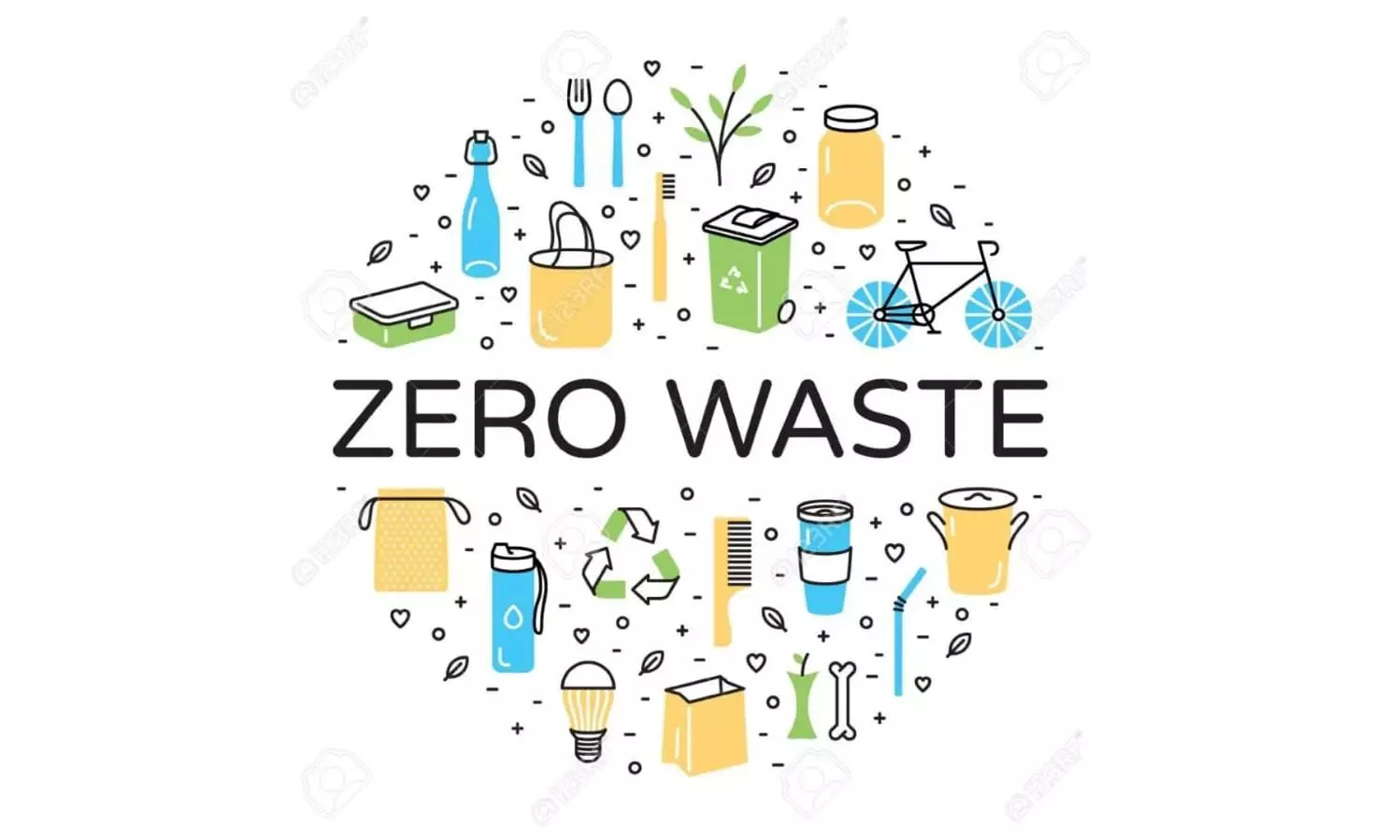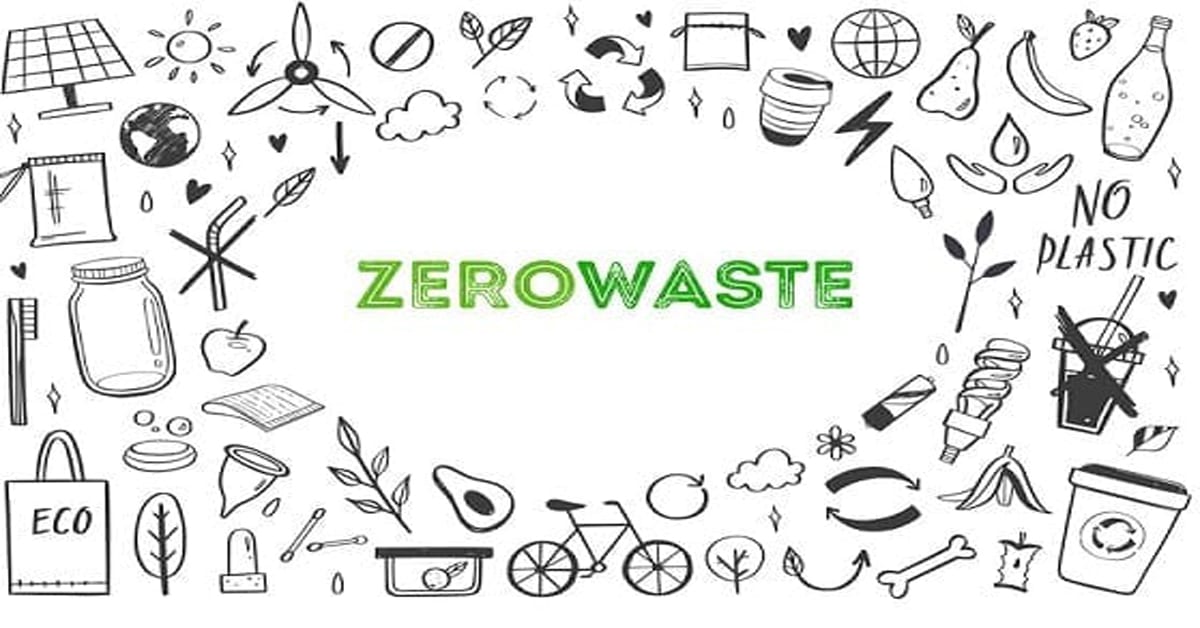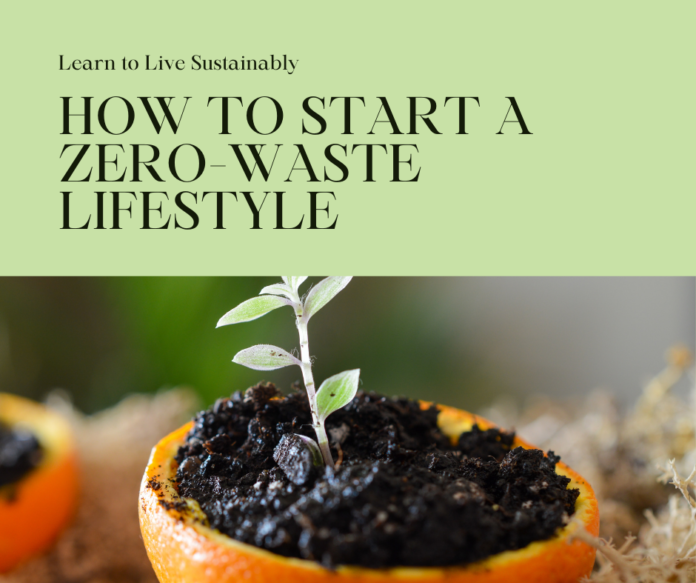Last Updated on April 9, 2024 by Silvy
How to Start a Zero-Waste Lifestyle: A Beginner’s Guide to Embracing Sustainability
Have you ever stared into the abyss of your overflowing trash can and felt a pang of guilt? You’re not alone. In today’s world of convenience culture, single-use plastics, and excessive packaging, waste seems inevitable.
But what if we told you there’s a way to live a more mindful and eco-friendly life, reducing your environmental impact and feeling good about it? Enter the zero-waste lifestyle.
Now, achieving “zero waste” might sound like an idealistic pipe dream. But the truth is, it’s a journey, not a destination. It’s about making conscious choices in your everyday life to minimize waste generation.

Why Go Zero-Waste?
Before diving in, let’s explore the compelling reasons to embrace a zero-waste lifestyle:
- Environmental Impact: Our throw-away culture is putting a strain on the planet. Landfills are overflowing, plastic is polluting our oceans, and excessive waste generation contributes to climate change. By reducing waste, you’re actively participating in a solution.
- Save Money: Think about all those single-use items you toss out – coffee cups, plastic wrap, disposable water bottles. Replacing them with reusable alternatives can save you money in the long run.
- Live More Mindfully: The zero-waste philosophy encourages you to be more mindful of your consumption habits. You’ll become a more conscious shopper, reducing clutter and appreciating the things you own.
- Empowerment: Taking control of your waste footprint is empowering. You’re making a positive difference, inspiring others to do the same.
Getting Started: The 5 R’s of Zero Waste
The zero-waste philosophy revolves around a simple yet powerful framework – the 5 R’s:
- Refuse: This is the golden rule. Say no to what you don’t need. Skip the plastic bags at the grocery store, politely decline freebies, and unsubscribe from junk mail.
- Reduce: Be mindful of what you consume. Do you need that new gadget? Can you borrow or rent instead of buying? Every item not purchased translates to less waste.
- Reuse: This is where the fun begins! Swap disposables for reusable alternatives. Invest in a reusable water bottle, cloth bags, and containers for shopping and food storage.
- Recycle: While reducing and reusing take priority, recycling is still important. Learn about your local recycling guidelines and ensure you’re recycling correctly.
- Rot: Food scraps and yard waste make excellent compost! Composting transforms kitchen waste into nutrient-rich soil for your garden, diverting waste from landfills and creating a valuable resource.

Beyond the Basics: Embracing a Zero-Waste Lifestyle in Every Area of Your Life
Now that you’ve grasped the core principles, let’s delve deeper into how to implement zero-waste practices in various aspects of your life:
The Kitchen:
- Meal Planning & Food Storage: Plan your meals to avoid food waste. Utilize reusable containers for leftovers and prioritize buying loose produce to minimize packaging.
- Composting Hero: Compost food scraps, eggshells, coffee grounds, and tea bags. Embrace the power of your kitchen compost bin!
- Bulk Buying: Consider buying staples like grains, nuts, and dried fruits in bulk from stores that allow you to use your own containers.
The Bathroom:
- Ditch the Disposables: Swap disposable razors for safety razors, bamboo toothbrushes, and menstrual cups. Invest in refillable containers for shampoo, conditioner, and body wash.
- Embrace Natural Alternatives: Make your own cleaning products using natural ingredients like vinegar, baking soda, and lemon juice.
Cleaning & Personal Care:
- Multipurpose Magic: Opt for concentrated, multi-purpose cleaning products to reduce the number of bottles you use.
- DIY Beauty: Explore making your own natural beauty products like scrubs and masks with simple ingredients.
Shopping & Fashion:
- Embrace Second-Hand: Give pre-loved clothes, furniture, and books a new life by shopping at thrift stores or consignment shops.
- Quality Over Quantity: Invest in well-made, durable items that will last for years.
- Repair & Upcycle: Learn basic mending skills or find a local tailor to extend the life of your clothes. Get creative and upcycle old items into something new.
Final Thoughts
Remember, the zero-waste journey is a marathon, not a sprint. Start small, celebrate your victories, and don’t be discouraged by setbacks. Every little bit counts! As you progress, you’ll inspire as you progress, you’ll inspire others to join the movement.
Together, we can create a more sustainable future, one reusable water bottle and compost bin at a time.

Here are some additional tips to keep you motivated:
- Connect with the Zero-Waste Community: Join online forums, Facebook groups, or local zero-waste meetups to connect with like-minded individuals. Share tips, exchange ideas, and find support on your journey.
- Get Creative: Don’t be afraid to experiment and find solutions that work for you. There are endless possibilities when it comes to reducing waste!
- Focus on the Positive: Celebrate your progress, no matter how small. Acknowledge the positive impact you’re making on the environment and feel proud of your efforts.
Embrace the Journey: FAQs about Zero-Waste Living
Is going zero-waste realistic?
Achieving absolute zero waste is challenging, but it’s not about perfection. It’s about significant waste reduction and striving to continuously improve. Every step you take gets you closer to a more sustainable lifestyle.
What are some easy wins for beginners?
- Carry a reusable water bottle and shopping bags.
- Opt for bar soap instead of body wash in plastic bottles.
- Pack your lunch in reusable containers.
- Buy loose fruits and vegetables instead of pre-packaged options.
- Compost food scraps and yard waste.
How can I get my family involved in zero-waste living?
- Lead by example! Your enthusiasm will be contagious.
- Involve your family in making zero-waste decisions. Discuss meal plans together, plan a trip to the thrift store, or get creative with DIY projects.
- Make it fun! Turn composting into a science experiment or challenge yourselves to a waste-free week.
I’m worried about the cost of switching to reusable items.
While some reusable products might have a higher upfront cost, they often pay for themselves in the long run. Plus, consider the cost savings from buying less disposable stuff. Remember, you can also find affordable reusable options at thrift stores or online marketplaces.
What if my community doesn’t have curbside composting?
Many communities offer composting drop-off locations. You can also explore backyard composting options or indoor countertop composters.
By taking action and embracing a zero-waste lifestyle, you’re not just reducing your environmental impact, you’re setting an example for others and creating a ripple effect of positive change.
Verified Source References
- Zero Waste International Alliance: https://zwia.org/ provides resources and information on the zero-waste movement.
- The Story of Stuff: https://storyofstuff.org/ documentary explores the life cycle of our products and the environmental impact.


